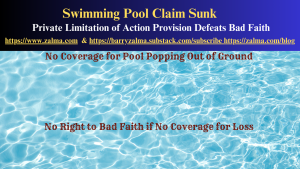Swimming Pool Claim Sunk

Post 4780
See the full video at https://rumble.com/v4pm4n0-swimming-pool-claim-sunk.html and at https://youtu.be/W9XJi0tdetE
No Right to Bad Faith If No Coverage for Loss
James H. Drevs and Patricia Henderson appealed from the order of the Law Division dismissing with prejudice their complaint seeking insurance coverage for storm damage to their real property.
In James H. Drevs and Patricia Henderson v. Metropolitan Property And Casualty Insurance Company, No. A-0637-22, Superior Court of New Jersey, Appellate Division (April 4, 2024) the Appellate Division applied the private limitation of action provision of the policy.
FACTS
Plaintiffs own property in Cherry Hill, which has a home and an inground swimming pool. In 2020, the property was insured under a policy issued by Farmers Property and Casualty Insurance Company, formerly known as defendant Metropolitan Property and Casualty Insurance Company.
On or about July 6, 2020, a windstorm and significant rainfall damaged plaintiffs’ home and swimming pool. Plaintiffs filed two claims for insurance coverage with defendant arising from the storm: the first claiming damage to the roof of their home and the second claiming a partial collapse of their inground pool.
Defendant undertook an investigation of plaintiffs’ claims. It hired an engineering firm to investigate the cause of the partial collapse of the pool. The engineering firm concluded the pool damage was caused by excessive hydrostatic pressure from significant rainfall during the July 6, 2020 storm. The insurer’s claims coordinator sent plaintiffs a letter denying their claim for coverage of the damage to the pool.
The claims coordinator issued a check to plaintiffs for the covered portion of the loss from the damaged roof of their home.
Plaintiffs sued defendant alleging breach of contract and bad faith in its denial of plaintiffs’ claim for coverage for the damage to their pool.
According to defendant, the one-year period began running again on September 14, 2020, when it denied plaintiffs’ pool damage claim. Defendant argued that because the complaint was filed on May 19, 2022, a year and eight months after September 14, 2020, it was time barred.
The trial court issued an oral opinion granting defendant’s motion.
ANALYSIS
The appellate court found no basis on which to reverse the trial court’s order. Plaintiffs’ policy is referenced in the complaint. The correspondence from defendant denying plaintiffs’ pool damage claim and granting their claim for damages to their house form the basis of plaintiffs’ claims. The September 14, 2020 letter unequivocally denied plaintiffs’ claim for coverage of the damage to their pool. Plaintiffs produced no evidence that the parties engaged in discussions, correspondence, or any other type of interaction in the seven months between defendant’s denial of plaintiffs’ pool damage claim and correspondence by counsel for the plaintiffs.
It was undisputed that more than one-and-a-half years passed between the September 14, 2020 denial of plaintiffs’ pool damage claim and the May 19, 2022 filing of the complaint.
A bad faith claim may not be asserted by a party who cannot establish a right to payment of the claim as a matter of law.
Because plaintiffs filed an untimely complaint challenging the denial of their claim, they cannot prove they are entitled to coverage for the damage to their pool.
Every first party property policy or homeowners policy contain a private limitations of action provision preventing insureds from suing one year after a loss. New Jersey, and many states, toll the running of the statute from the date of loss until the date the insurer makes an unequivocal denial of coverage. The insureds waited more than a year and a half after the denial of the claim and its suit was barred. They are not without a remedy, their lawyer knew or should have known of the limitation and failed to file suit within the period allowed nor did he seek an extension to the time to sue.
 (c) 2024 Barry Zalma & ClaimSchool, Inc.
(c) 2024 Barry Zalma & ClaimSchool, Inc.
Please tell your friends and colleagues about this blog and the videos and let them subscribe to the blog and the videos.
Subscribe to my substack at https://barryzalma.substack.com/subscribe
Go to X @bzalma; Go to Newsbreak.com https://www.newsbreak.com/@c/1653419?s=01; Go to Barry Zalma videos at Rumble.com at https://rumble.com/c/c-262921; Go to Barry Zalma on YouTube- https://www.youtube.com/channel/UCysiZklEtxZsSF9DfC0Expg.
Go to the Insurance Claims Library – https://lnkd.in/gwEYk.
Like this:
Loading…
Related
About Barry Zalma
An insurance coverage and claims handling author, consultant and expert witness with more than 48 years of practical and court room experience.







